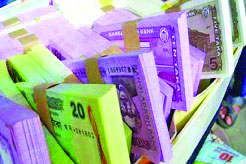Annual Taka printing cost over Tk 384 cr
Staff Correspondent : About Tk 384 crore are spent every year on printing different denominations of taka (currency) used as a medium of exchange in the country. Emphasizing the implementation of cashless transactions to save costs, it was said in a related meeting that to implement universal cashless transactions, all stakeholders involved in digital payments, including banks, payment service providers (PSPs), payment service providers (PSOs) and MFSs, must be coordinated. Field administration should be involved to move cashless transactions from urban to village level haat-bazaars. Recently, the ICT cell of the cabinet department of the government organized the meeting regarding ‘Implementation of Cashless Transactions’. At this time, the executive director of Bangladesh Bank decided to implement cashless transactions. A 9-member committee was formed headed by Majbaul Haque.
This information was found by reviewing the minutes of the meeting. It was presided over by the Secretary of the Cabinet Department (Coordination and Reforms) Mahmudul Hossain Khan.
The government hopes that the implementation of cashless transactions will ensure the transparency of transactions as well as cost savings related to cash management. Along with that it will be possible to easily track the income-expenditure account. As a result, income tax evasion will be reduced and money laundering will be reduced to a large extent.
According to sources, in coordination with Prime Minister Sheikh Hasina’s ‘Smart Bangladesh’ vision, Bangladesh Vision Plan 2021-41 and the Eighth Five Year Plan, Bangladesh Bank has taken the ‘Cashless Bangladesh’ initiative to bring the country’s marginalized population into the digital payment ecosystem. Under this initiative, the central bank has planned to digitize 75 percent of the country’s transactions by 2027. Apart from this, the implementation of cashless transactions has been emphasized by the government in building Smart Bangladesh. As part of this, on January 30, a meeting was organized by the ICT Cell of the Cabinet Department of the Government regarding ‘Implementation of Cashless Transactions’. Executive Director of Payment System Department of Bangladesh Bank Majbaul Haqgave a brief presentation on Cashless Bangladesh at that meeting. It highlights various topics including what is cashless transaction, its benefits and risks, current status and future plans of cashless transaction.
The meeting said that currently there are ample opportunities for digital payments in the country, such as digital payments can be made using cards, internet banking, QR codes, MFS and mobile apps. But it turns out, there are some big city-based stores and merchant outlets in the country. Although there is a digital payment system for public and private services, digital payment opportunities have not been created in most parts of the country or there are not enough access points. As a result, most of the banks, MFS and PSPs have to convert e-money back into cash and transact. Such conversion would not be necessary if e-money was used for all types of payments. In such a situation, the things that are most needed to implement cashless transactions are service provider capacity, inter-operability between service providers and creation of sufficient access points for making digital payments. Besides, it is also necessary to increase the awareness among people about digital transactions.
Majbaul Haque said that special emphasis should be placed on creating digital access points at all locations across the country to implement cashless transactions. People should be encouraged to use these points for cashless transactions. Cashless transaction ecosystem should be created in all bazaars, shops and other places of the country. In this case, incentives can be given to merchants and service users doing cashless transactions.
Additional Director of Bangladesh Bank Shah Ziaul Haque said that if merchants are to be brought under the scope of digital transactions, extra benefits should be given in digital transactions. Besides, customers should also be given incentives for digital payments. In this case the government can provide subsidy. India is giving such incentives. He further said that to implement cashless transactions, we need to create a platform from where all types of bill payments can be made and bring all MFSs and banks on that single platform.
Association of Bankers, Bangladesh (ABB) representative. Sabbir Hossain said, to implement cashless transactions, all related calls should be made toll free and transaction notification or SMS costs should be reduced.
Faisal Shahid, Head of Merchant Payments at Bkash, said that the use of smart phones should be increased to implement cashless transactions. Besides, the amount of tax on the devices used for digital payments should be reduced. He also said that not only the internet connectivity should be increased in the remote areas of the country, but also the quality of the internet should be ensured.
Saeed Ali, Deputy Secretary of the Ministry of Commerce, said that cash on delivery is currently common in e-commerce payments. Digital payments should be made mandatory in e-commerce to increase cashless transactions.
Director of Bangladesh Telecommunication Control Commission Lt. Col. SM Rezaur Rahman said, security is a big issue in cashless transactions, because there is a possibility of many types of fraud in digital transactions. For example, one person using the phone number with another person’s national identity card. As a result, in case of financial fraud, it becomes very difficult to find the real fraudster. BTRC is providing security at this place.
In the president’s speech. Mahmudul Hossain Khan said that all transactions should be made cashless as soon as possible. At present, different platforms are being used for receiving cashless services, which are not inter-operable with each other, resulting in wastage of money. These need to be simplified and all platforms should be integrated into a single specialized platform. Through which it will be possible to pay all types of fees, buy transport tickets and pay tolls.
Rare Israeli airstrike in Beirut kills Hezbollah commander and more than a dozen others
International Desk: Israel launched a rare airstrike that killed a senior Hezbollah milita…








